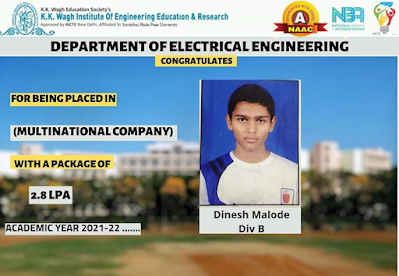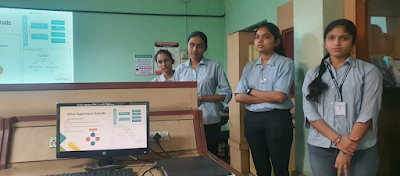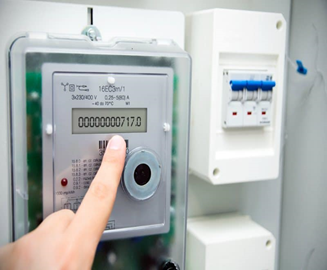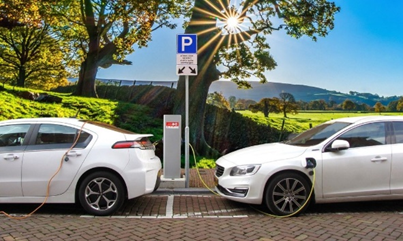From HoD’s Desk
The presence of students, right from First Year to Final Year, in the campus, post corona in huge number was observed in March. The load of the resources was also observed by each section and department, right from the library to the canteen. This actually created a wave of happiness on the campus. Not only the teaching-learning activities but also the activities like training and placement, events, student participation, NSS activities, etc. have been impacted. Hope this continues now forever without interruption.
Department Events
Expert Session on “EV Batteries Research” by Shri. Ashok Nagarkatti (10/03/2022)
Expert Session on “E-Mobility and Future Scope in EV" by Shri. Yashodip Patil (19/03/2022)
Women’s Day Celebration (08/03/2022)
A total of 58 First year, Third year, Final year girl students along with ladies faculty members were present for this function. EFFECT team members conducted one-minute games during this event. Prizes were also given to the winners. Some students shared their views about Women’s day on this occasion. This celebration was coordinated by the EFFECT Student Body coordinators and members.
Research Talk - 2022
Department of Electrical Engineering in association with IET Nashik Local Network has organized two days of “Research Talk - 2022” by Dr. Niraj Kumar Dewangan, Dr. Saif Ahmad, Dr. Rajesh M. Pindhoria and Mukul Dixit on the 25th and 26th March 2022 for UG, PG, Ph.D. Scholars and faculty members. The speakers shared the complete process of writing their own research paper, including motivation, mathematical modelling, simulation, hardware development, recent topics and future scope, etc. Total 79 Participants UG, PG, Ph.D. Scholars and faculty actively participated in Research Talk 2022. This event was coordinated by Prof. S. Saravanan. The names of speakers and their topics are given in the flyer given below.Student Corner
Student Placement
Following
students are placed in various multinational companies. Congratulations to all
the students!
Placed Students Details (March 2022)
|
Sr. No. |
Name of the Student |
Placement Date |
Batch |
|
1 |
Sayali
Satish Ingale |
31/01/2022 & 19/03/2022 |
2021-22 |
|
2 |
Bhor
Dhanashree Popat |
19/03/2022 |
2021-22 |
|
3 |
Pawar
Shraddha Govind |
19/03/2022 |
2021-22 |
|
4 |
Wagh
Priyanka Yashwant |
19/03/2022 |
2021-22 |
|
5 |
Phase
Sharvari Shantanu |
19/03/2022 |
2021-22 |
|
6 |
Chaudhari
Nilesh Amrut |
19/03/2022 |
2021-22 |
|
7 |
Dharaskar
Vedika Rajesh |
26/03/2022 |
2021-22 |
|
8 |
Sonawane
Madhuri Shivnath |
29/03/2022 |
2021-22 |
|
9 |
Tambe
Jaydip Maruti |
31/3/2022 |
2021-22 |
|
10 |
Porje
Shraddha Kailas |
31/3/2022 |
2021-22 |
|
11 |
Akanksha
shinde |
16/03/2022 |
2021-22 |
|
12 |
Malode
Dinesh Balasaheb |
19/3/2022 |
2021-22 |
|
13 |
Naikwade
Siddhi Suryabhan |
19/03/2022 |
2021-22 |
|
14 |
Benson
Unika Pratod |
19/03/2022 |
2021-22 |
|
15 |
More
Nikita Ashok |
31/3/2022 |
2021-22 |
|
16 |
Somwanshi
Vaishali Jaywant |
31/3/2022 |
2021-22 |
|
17 |
Suryawanshi
Makarand Sunil |
22/03/2022 |
2021-22 |
|
18 |
Warungase
Pratik Sanjay |
22/03/2022 |
2021-22 |
Student Felicitation
Following
students are felicitated for their placement in various multinational
companies. Congratulations to all the students!
Placed Students Felicitation Details (March
2022)
|
Sr. No. |
Name of the Student |
Batch |
Felicitation Date |
|
1 |
Prathmesh
Ulhas Kulkarni |
2021-22 |
12/03/2022 |
|
2 |
Saurabh
Avinash Kamble |
2021-22 |
12/03/2022 |
|
3 |
Sayali
Satish Ingale |
2021-22 |
12/03/2022 |
|
4 |
Phase
Sharvari Shantanu |
2021-22 |
12/03/2022 |
|
5 |
Gavate
Chetan Jitendra |
2021-22 |
12/03/2022 |
|
6 |
Chaudhari
Nilesh Amrut |
2021-22 |
12/03/2022 |
|
7 |
Patil
Rushikesh Dilip |
2021-22 |
12/03/2022 |
|
8 |
Bhor
Darshan Sunil |
2021-22 |
12/03/2022 |
|
9 |
Kapse
Kartik Balasaheb |
2021-22 |
12/03/2022 |
|
10 |
Megha
Anant Hire |
2021-22 |
12/03/2022 |
|
11 |
Rashmi
Hiraman Jadhav |
2021-22 |
12/03/2022 |
|
12 |
Trupti
Prakash Bharamgunde |
2021-22 |
12/03/2022 |
|
13 |
Mote
Amol Sitaram |
2021-22 |
12/03/2022 |
|
14 |
Vishwakarma
Abhishek Jawaharlal |
2021-22 |
12/03/2022 |
|
15 |
Jadhav
Om Kamlakar |
2021-22 |
12/03/2022 |
|
16 |
Lohar
Vishal Raju |
2021-22 |
12/03/2022 |
|
17 |
Patil
Shlok Ashok |
2021-22 |
12/03/2022 |
|
18 |
Patil
Prathamesh Chandrakant |
2021-22 |
12/03/2022 |
Student Participation in Smart
India Hackathon (SIH)
As a part of
the Smart India Hackathon (SIH), students from the department participated in
the institute level round conducted during 26-27 March 2022. In this, around 35
students participated from Electrical Department. Prof. J. P. Shah guided the students.
Student Participation in Smart India Hackathon (SIH)
Students from BE Electrical
1. Saurabh Baban Sonawane
2. Divya Manohar Chaudhari
3. Shubham Rajesh Rasane
4. Prathamesh Vasant Sarode
Have demonstrated the project on ‘Super capacitor-based electric vehicle system’ in AIMA Index 2022. Their project is well appreciated by visitors, students, investors, and industry professionals. The project is guided by Prof. Sudhir Shinde.
Course Completion by Students
The following students completed the online/offline courses.
|
Name of students |
Name of course |
Duration |
Platform |
Name of
organization |
|
Gaurav Rajesh Mistary SE (Electrical) Div. B |
Design challenges on Motors& Controllers for
EV applications |
1 week |
Online IEEE Student Branch supported workshop |
St.Joseph’s Institute of Technology, Chennai |
Student Achievements
1. Tejas Rayate and Pranjal Jain of TE (Electrical) Div. B, have been awarded the First Prize in the Quiz Competition Techvoltz 2022, held on 31st March 2022 by Guru Gobind Singh College of Engineering and Research Institute, Nashik in association with the Electrical Engineering Students' Association.
2. GATE-2022: Around 56 students appeared for the GATE 2022. Out of these 4 students
have obtained a valid GATE Score.
|
Name of the candidates |
GATE score |
Class |
|
Patil Rushikesh Dilip |
582 |
BE- A |
|
Lohar Vishal Raju |
496 |
BE-B |
|
Sarode Manish Chandrakant |
393 |
BE-B |
|
Rathod Prasad |
353 |
TE-A |
3. Final Year Student Photograph: For the Institute Annual Magazine, the photographs of the Final Year students are taken with the Principal, Head of the Department, and class Coordinator. During the last two years, due to COVID, it was not done. But for this year for the batch of 2022, it was completed. The photographs of two divisions are clicked with the Principal, Head, and Class coordinator.
Group Photo of Div. A with Dr. K. N. Nandurkar (Principal), Dr. R. K.
Munje (I/C HOD) and Prof. S. K. Shinde (Class-coordinator)
Group Photo of Div. B with Dr. K. N. Nandurkar (Principal), Dr. R. K. Munje (I/C HOD) and Prof. A. M. Shewale (Class-coordinator)
Faculty Corner
Faculty Participation
The following
staff members have completed the courses given below in March 2022
|
Name of staff |
Name of course |
Duration |
Platform |
Name of Organization |
|
Dr.
Ravindra Munje |
Internship |
4 Weeks |
Online Internship |
Pantech E-Learning |
|
Pooja Sagar Sapkate |
Emerging
Technologies |
5 Day |
Online FDP |
NIT Durgapur |
|
Priya M. Vyavahare |
Emerging
Technologies |
5 Day |
Online FDP |
NIT Durgapur |
1. Department
faculty and staff members have attended the IQAC Teachers
Training Session by Prof. Dr. Pratibha
Nagabhushan, Australian Catholic University, Melbourne on ‘Project Report
Writing Guidelines’ conducted on 17th March 2022 from 3.00 pm
onwards in online mode.
2. Department
faculty and staff members have attended the IQAC Teachers
Training Session by Prof. Dr. Sophia Gaikwad, Head,
Symbiosis Teaching Learning Resource, Symbiosis International (Deemed
University) on Alternative Assessment conducted on 22nd
March 2022 from 3.00 pm onwards in online mode.
3. Department
faculty and staff members have attended the Sessions by Prof. N. J.
Rao, IISc Bengaluru on Outcome Based Education organized by the Department
of Electronics and Telecommunication conducted on 30th
and 31st March 2022 from 3.00 pm onwards in online mode.
4. Dr.
R. K. Munje has delivered a session on ‘Importance
of Research in Engineering’ on 29th March 2022 in online mode
from 3.00 pm to 5.00 pm at Zeal College of Engineering and Research, Pune.
5. Department faculties, Prof S.A. Sagare and Prof Merin John delivered
sessions at Indian Railways Institute of Electrical Engineering (IRIEEN),
Nashik. Prof S.A. Sagare conducted on Basic Electrical Engineering (6 sessions)
and Prof Merin John conducted sessions on Power Electronics (5 sessions) in
offline mode.
BEE- 25/01/2022, 25/02/2022, 04/03/2022,
09/03/2022, 23/03/2022, 30/03/2022
PE-22/02/2022, 04/04/2022, 11/03/2022, 23/03/2022, 30/03/2022
National Service Scheme (NSS)
The Institute
level NSS camp was conducted from 27th February to 6th
March 2022 at Mohagaon Village in Nashik District. The faculties and students
from the Electrical department participated in this camp. Around 8 students
participated from Electrical Department. Prof.
J. P. Shah, Prof S.A. Sagare, and Priya Vyavahare guided the students in
various activities. Names of the students participating in this cam are given
below.
|
Sr. No. |
Name of the
students |
Batch |
|
1. |
Ahire
Arambh |
2022-23 |
|
2. |
Tejas
Rayate |
2022-23 |
|
3. |
Pranjal
Jain |
2022-23 |
|
4. |
Bangar
Vrushali |
2022-23 |
|
5. |
Chikhalkar
Jayesh |
2022-23 |
|
6. |
Varun
Bhadane |
2023-24 |
|
7. |
Harshal
Kharche |
2023-24 |
|
8. |
Pranav
Madhukar Kalme |
2023-24 |
ई -मोर्टल ऑटोमोटिव्हसला महाराष्ट्र उद्योग रत्न पुरस्कार प्रदान
रिव्हल संस्थे मार्फत देण्यात येणारा २०२२ चा महाराष्ट्र उद्योग रत्न पुरस्कार नाशिकमधील ई-मोर्टल ऑटोमोटिव्हीस् या कंपनीला 'महाराष्ट्रातील सर्वोत्कृष्ट लिथियम बॅटरी' निर्मिती या श्रेणीसाठी अभिनेत्री सोनाली कुलकर्णी यांच्या हस्ते देण्यात आला.
के. के. वाघ अभियांत्रिकी महाविद्यालयातील विद्युत अभियांत्रिकी शाखेत २०१९ साली शिक्षण पूर्ण केल्यानंतर मयूर शेलार, धवल तगारे आणि ओंकार सोनवणे यांनी इमॉरटल ऑटोमोटिव्हज् ची स्थापना केली. महाविद्यालयातील शेवटच्या वर्षात असताना त्यांनी आपल्या सहकऱ्यांबरोबर विद्युत वाहनाची निर्मिती केली व या क्षेत्रातच पुढे व्यवसाय करण्याचे ठरवले. २०२० साली त्यांनी बॅटरी निर्मिती साठी २०० स्क्वे. फू. च्या छोट्या जागेत आपल्या व्यवसायाला सुरुवात केली ज्याचे रूपांतर आता ३००० स्क्वे.फू च्या कंपनीत झाले आहे. त्यांनी सुरुवात सोलर पथदीप साठी लागणाऱ्या बॅटरीज् पासून सुरु झाली. त्यानंतर त्यात संशोधन केल्यानंतर युनिक अरेंजमेंट पद्धतीचा वापर करून बॅटरीची कार्यक्षमता आणि आयुष्य वाढवण्यावर भर दिला. आता सोलर सोबतच इलेक्ट्रिक व्हेईकल, लिफ्ट, ट्रॅफीक लाईट, कम्युनिकेशन टॉवर इत्यादी क्षेत्रात वापरल्या जाणाऱ्या बॅटरीज् चे उत्पादन इमॉरटल ऑटोमोटिव्हज् द्वारा केले जाते. नाशिक सोबत महाराष्ट्राबाहेर सुद्धा आज अनेक ठिकाणी या बॅटरीला मागणी आहे. बॅटरी निर्मितीसोबतच आता ई -मोर्टल ऑटोमोटिव्हज् ची टीम स्वतःच्या इलेक्ट्रिक व्हेईकल निर्मितीसाठी काम करत आहे. यासाठी केंद्र सरकारच्या उद्योग आणि अंतर्गत व्यापार प्रोत्साहन विभागाने (DPIIT) मान्यता दिली आहे. नाशिकमधील नवउद्योजकांसाठी ही बातमी नक्कीच प्रेरणादायक ठरेल.
अभियांत्रिकीचे शिक्षण घेत असतांना विविध शिक्षक तज्ज्ञांकडून झालेल्या मार्गदर्शामुळेच हे यश संपादन करता आले असे मत धवल तगारे यांनी व्यक्त केले. प्राचार्य डॉ केशव नांदुरकर आणि विभाग प्रमुख डॉ बी ई. कुशारे यांच्या प्रेरणेमुळेच उद्योजक बनण्याचे बीज मनात पेरले गेले व ते प्रत्यक्ष आले अशी भावना मयूर शेलार आणि ओंकार सोनावणे यांनी व्यक्त केली. त्यांच्या या यशाबद्दल व पुढील वाटचालीबद्दल संस्थेचे विश्वस्त श्री. समीर वाघ, प्राचार्य केशव नांदुरकर आणि प्रभारी विभाग प्रमुख डॉ रवींद्र मुंजे यांनी शुभेच्छा दिल्या.
Student Articles
SMART GRID TECHNOLOGY APPLICATIONS LEADING MAJOR CHANGES
Srushti Kiran Pawar, TE (Electrical) Div. B
(pawarsrushti4@gmail.com)
We
will discuss six key
applications for Smart Grid technology in this blog post. They are
advanced metering infrastructure, demand response, electric vehicles, wide-area
situational awareness; distributed energy resources and storage; and
distribution grid management.
1. Advanced Metering Infrastructure
This
is also known as AMI. It’s simply applying technologies like smart
meters to help with the two-way flow of information between customers and
utility agencies. This information revolves around consumption time, amount,
and appropriate pricing. It enables smart grids to have a wide range of
functions compared to conventional grid technologies.
·
·
Remote consumption control
·
Time-based pricing
·
Consumption forecast
·
Fault and outage detection
·
Remote connection and disconnection of users
·
Theft detection and loss measurements
·
Effective cash collection and debt management
Having these functions means gaining better control over power efficiency and quality in smart grids across the globe. Still, there are a few drawbacks that worry consumers and utility agencies alike, such as privacy and confidentiality issues and cybersecurity issues relating to unauthorized access to AMI devices.
2. Demand Response
Demand
response (DR)
programs are recent and emerging applications for demand‐side management (DSM).
Examples are applications that improve grids’ reliability by providing services
such as frequency control, spinning reserves and operating reserves, and
applications that help reduce wholesale energy prices and their volatility.
The
development of energy regulatory commissions with open wholesale markets and
policy support has enabled demand response applications in grid technology.
There are two categories of demand response programs from the customer
perspective:
·
Price‐based DR: where customers adjust their electricity consumption
in response to the time-variant prices created by their utility agencies to
maximize their electricity usage and save on bills
·
Incentive‐based DR: where benefits are increased by promoting an
incentive to influence customer behaviors to change their demand consumption
DR
provides the opportunity for consumers to reduce or shift their electricity
usage during peak periods through the programs mentioned above, giving them a
huge role in the operation of electric grids with the hopes of balancing supply
and demand needs.
3. Electric Vehicles (EVs)
This
may seem like a misplaced application for smart grids, but with the obvious
electrification of the transport industry, EVs are a preferred solution to
global warming issues. In terms of smart grid technologies, plug-in electric
vehicles’ introduction comes with myriad challenges and opportunities to
sustain power systems. If EVs are added to the grids as regular loads, then
there will be no allowance for flexibility of load variables, which will
endanger the grid as a whole.
4. Wide-Area Situational Awareness
This
refers to the implementation
of a set of technologies designed to improve the monitoring of the power system across large geographic areas — effectively
providing grid operators with a broad and dynamic picture of the functioning of
the grid.
WASA
systems provide operators and engineers with the right information at the right
time for efficient operation and analysis of the power system, according
to SELinc. The ultimate goal here remains the same: to understand and
optimize the smart grid’s reliability through its performance and anticipate
where necessary changes need to occur before problems abound.
·
Real-time monitoring
·
Prediction of future disturbances
5. Distributed Energy Resources and Storage
Distributed
energy resources are also known as DER and are part of Distributed generation; they
refer to energy sources or generation units that are smaller and located on the
consumer side of the electricity generation meter.
Energy
is generated from sources (mostly renewable) near the point of use rather than
from a centralized system. Some examples are rooftop solar photovoltaic units
and wind generating units.
While
DER storage involves systems that store distributed energy for later use. This
is done with two components; DC-charged batteries and bi-directional inverters.
It helps in balancing energy generation, demand, and supply. Some other key
features are:
·
Peak shaving
·
Load shifting
·
Voltage regulation
·
Renewable integration
·
Back-up power
6. Distribution Grid Management
A distribution
grid includes
all the equipment needed for energy distribution, such as wires, poles,
transformers, etc. The management
of the distribution grid in smart grids has to do with having a system “capable of
collecting, organizing, displaying and analyzing real-time or near real-time
electric distribution system information” as needed.
This
system can also allow grid operators to plan and place complex tasks to
increase efficiency, meet targets, prevent failures and optimize energy flow.
It can also work hand in hand with other systems to create a combined outlook
of distributed operations.
Smart grid technologies are created to be smart, with the capabilities of predetermining faults that can then be prevented, cut costs where possible, and deliver the best value to consumers when needed.
Comparison of kWh and kVAh billing system
Shraddha Jadhav, TE (Electrical) Div. B
As
per the MERC order, computation of electricity consumption including kVAh
leading has been incorporated in the billing of electricity. Also, as per the MERC
order, the kVAh tariff is implemented in Maharashtra from 1st April
2020
It
is a well-known fact that the industrial load consists majorly of inductive
load which generates some amount of reactive power for them to function. This
reactive power is compensated by the capacitor bank installed in parallel to
the load. Else, this equipment tends to draw the reactive power from the grid
which MSEDCL has to draw from the grid. These industrial units are required to
maintain their equipment and install the capacitors to maintain the power
factor, however, not all industrial units do so. This leads to a reduction in
power factor and system inefficiency.
If
the tariff is only fixed for active energy measured( kWh basis), the supplier
has to meet the loss in the supply system due to additional current drawn due
to the poor power factor of the load maintained by the consumers. Else to
eliminate the losses, regulatory measures have to be initiated upon the consumers
who do not maintain the power factor of the load at unity or a specified value.
Imposing penalty on consumers who create this burden, by identifying them
through tasks, is not practical and feasible for the utility, which further
leads to billing disputes. Therefore, consideration of apparent power( active
as well as reactive) or also known as kVAh while billing the consumers is
inevitable as reactive power is the integral part of the power supplied.
However,
excessive use of auxiliary equipment introduces harmonics in the power system
which disturbs the health of the power system and gives negative consequences.
Therefore is vital to have reactive power in the electricity distribution system but must minimize to maintain the productivity of the electricity distribution framework.
About Newsletter
Declaration
Newsletter Committee
Please follow us on
Facebook: https://www.facebook.com/electrical.engg.kkwagh/
Blog: https://electricalkkwieer.blogspot.com/
YouTube: https://www.youtube.com/channel/UC08p5pixINTipmb2qv2IDkQ
Telegram: https://t.me/eekkwiee




































No comments:
Post a Comment